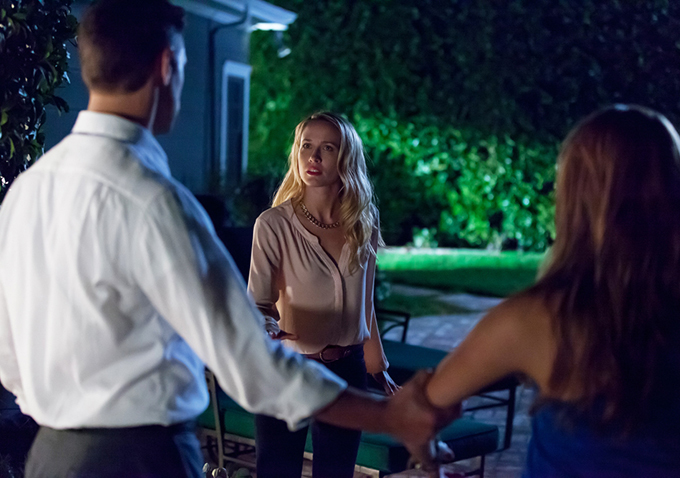 "Caught"
"Caught"
Largely a four-hander featuring a high school track star, the older businessman with whom she’s having an affair, the man’s wife, and the wife’s sister, “Caught” unfolds in a single suburban house and breaks out all the machinations to keep them there. If you’ve seen “Wait Until Dark” or “Panic Room,” you know the hiding spots, the camera angles, the shifts in power dynamics over a single evening. But director Maggie Kiley floods every room with light, bumps the bright production design up to overt, and sets a satirical tone that sets the thriller apart.
Her teenage protagonist Allie (Stefanie Scott) sits at the film’s moral and thematic center, as a flawed, failing student wrapped up in a seemingly perfect package. It’s the ideal picture for bubbly housewife Sabrina (Anna Camp) to covet, and also attempt to destroy by kidnapping Allie with her sister Paige (Amelia Rose Blaire). Tying her up in the house she shares with her husband (Sam Page), Sabrina turns the plot into more “Heathers” than “Hostel,” but soon the major players file in to confront their choices and slowly spiral into mind games and violence.
Though Marcy Holland’s script weaves in a few vicious lines and an intriguing throughline of family and fertility, the characters remain caricatures. The fun comes instead from how Kiley executes her version of a single-location thriller. As Allie’s mother (an effective Mary B. McCann) tries to locate her daughter on the outside, the depths to which the squeaky-clean Sabrina dives are enjoyable to track, and Blaire provides an empathetic counterpoint to the madness going on with her sister.
Before an underwhelming third act slowly drains the invention and charm of the first two-thirds, “Caught” pulls off a tightwire thriller that aims for fresh corners of the genre. The satisfaction with the uneven result will vary, but Kiley’s slick directorial abilities will guide you through the rougher patches of a long night. [C+]
READ MORE: Check Out All Of Our Los Angeles Film Festival Coverage Here

“Crumbs”
I wonder if Alejandro Jodorowsky’s tarot practices could predict “Crumbs," a spiritually-related Hero’s Journey set in post-apocalyptic Ethiopia, directed by newcomer Miguel Llansó. It’s a beguiling first feature, with surprises that announce themselves and only grow stranger: a broken-down society that views Michael Jordan as a god and old children’s toys as gold; armed Nazi hunters trawling the barren landscape; a witch living in the forest, listening to Michael Jackson.
Like Jodorowsky and Andrei Tarkovsky’s work — two clear touchpoints here — these elements carry great meaning and also none at all. Give or take a few extreme events, they leave our junk collector protagonist Birdy (Daniel Tadesse) in the same state. But there are grace notes, situations that build a mystifying reflective mood that’s often very funny as well. When a film sends its hero on his way because a vision of a black Santa Claus haunts the bowling alley where Birdy and his wife Candy (a fantastic Selam Tesfaye) live and work, it’s near impossible not to wonder where the narrative will lead.
Armed with an ambient soundtrack and the alien visual possibilities of Ethiopia (the film was shot by Israel Seoane around the desolate town of Dallol), Llansó has created a unique achievement that throws out some clever commentary on consumerism once we’ve died off (spoiler: Justin Bieber will remain eternal). A compelling performance by Tadesse, Llansó’s regular collaborator, keeps us grounded, and the 68-minute runtime ensures a brief but fulfilling quest on its way to discover Santa. [A-]

“Incorruptible”
Director Elizabeth Chai Vasarhelyi’s documentary “Incorruptible” — her third set in Senegal — takes a gripping, fly-on-the-wall look at a shifting tide in African politics, from its first inklings to demonstration and finally results. When Abdoulaye Wade, President of Senegal in 2011, changed the country’s constitution to allow for a third term as he was ending his second, a swift chasm emerged. There was outrage from those who cherished the democratic process, and of course wild support from Wade’s powerful supporters.
The film takes immediate care to paint Senegal as a destination of political dialogue and not unending violence, which makes Wade’s maneuvers so tyrannical. When Vasarhelyi accompanies pro-democracy activists into protests, and the police brutally retaliate in a few danger-ridden encounters, she focuses on the anger and rage in the aftermath (a scene where practicing Muslims express shock at the police’s disrespectful actions outside a mosque is particularly moving).
Moments within the pro-democracy group Y’en A Marre (Enough is Enough) provide additional personal perspectives on the situation, as does political contender Macky Sall, Wade’s former prime minister and first-hand observer of his corrupt actions. Vasarhelyi takes great care to outline the road blocks to Wade’s removal and Sall’s election — rigged voting booths, intimidation, hush money — and builds tension to this incredibly solid, nuanced underdog story with immense consequences. [B+]

